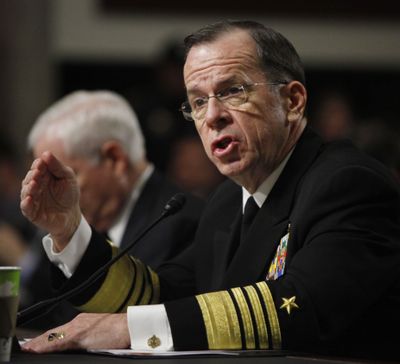Gays should serve openly, admiral says
Mullen’s testimony draws fire from GOP senators

WASHINGTON – The nation’s top military officer told Congress on Tuesday that gay men and lesbians should be allowed to serve openly in the military, the strongest endorsement ever by the nation’s military leadership for overturning the law that excludes them from the U.S. Army, Air Force, Navy and Marine Corps.
Chairman of the Joint Chiefs of Staff Adm. Mike Mullen called repeal of the ban “the right thing to do.”
“No matter how I look at the issue, I cannot escape being troubled by the fact that we have in place a policy which forces young men and women to lie about who they are in order to defend their fellow citizens,” Mullen told the Senate Armed Services Committee.
Mullen’s testimony drew angry responses from most of the committee’s Republicans, in contrast to the deference they’d shown Mullen and Defense Secretary Robert Gates in a morning session on the Pentagon’s budget, where the Republicans declared the men two of the nation’s finest public servants.
Sen. John McCain of Arizona spelled out his objections to repealing the law, calling the current policy imperfect but effective, despite having said four years ago that he’d defer to the wishes of military leaders on the matter.
Sen. Jeff Sessions of Alabama pointedly reminded Mullen that Congress, not the chairman, will decide if the law should be changed.
“I don’t think they are required to lie about who they are. I think that is an overstatement,” Sessions told Mullen. “You shouldn’t use your power to influence a discussion.”
“This is about leadership, and I take that very, very seriously,” Mullen responded.
Defense Secretary Robert Gates told the hearing that he thinks it’s a matter of when, not if, the law will be repealed. Gates said he’d ordered a 45-day review of the regulations used to implement the current law in an effort to find a “fairer way to enforce it.”
He also said he had asked the Pentagon’s chief legal adviser, Jeh Johnson, and the head of the U.S. Army in Europe, Gen. Carter Ham, to head a panel to study what steps would be necessary were the ban to be lifted. The study will take at least a year to complete.
“The mandate of this working group is to thoroughly, objectively and methodically examine all aspects of this question and produce its finding and recommendations in the form of an implementation plan by the end of this calendar year,” Gates said. “A guiding principle of our efforts will be to minimize disruption and polarization within the ranks, with special attention paid to those serving on the front lines.”
Mullen, who as chairman of the Joint Chiefs of Staff is the nation’s highest-ranking officer, said that he’d served with gay sailors and soldiers since 1968.
Mullen’s and Gates’ testimonies marked a watershed moment in the long debate over what the U.S. should do about the prohibition on openly gay service members, which has been part of U.S. military policy since 1950.
President Bill Clinton sought to eliminate the ban in 1993, but faced with opposition from both top military officers and Congress, instead issued the so-called “don’t ask, don’t tell” executive order that guides current enforcement.
Under that order, military officers aren’t supposed to inquire about service members’ sexual orientation or seek to know it, while service members themselves are to keep quiet about it.
The rule also requires officers to act if they learn that a subordinate is gay.
Since “don’t ask, don’t tell” went into effect, roughly 13,000 service members have left the military because of the rule.
Tuesday’s hearing was scheduled in response to President Barack Obama’s call during his State of the Union address last week for ending the ban. It was easily one of the most contentious hearings either Gates or Mullen have appeared at since they were appointed to their posts by Republican President George W. Bush.
As the hearing progressed, Gates’ face grew visibly taut as he listened to senator after senator admonish him and Mullen for contemplating a change in policy.
Saying he was “deeply disappointed” in the two men, McCain urged Mullen and Gates to “keep the impact it will have on our forces firmly in mind.”
Among the Republicans, only Sen. Susan Collins of Maine didn’t attack Mullen and Gates. Democrats were supportive of the repeal and stepped in to defend Mullen from the Republican assault.
“You don’t have to be straight to shoot straight,” Sen. Mark Udall, D-Colo., said after McCain spoke, quoting McCain’s predecessor, Republican Sen. Barry Goldwater, the Arizona conservative who famously reversed his opposition to gays in the military in the 1990s.
Despite Mullen’s support, it remains unclear how much of the military’s top brass favors repealing the ban.
Marine Corps Commandant Gen. James Conway has said he opposes ending “don’t ask, don’t tell.”